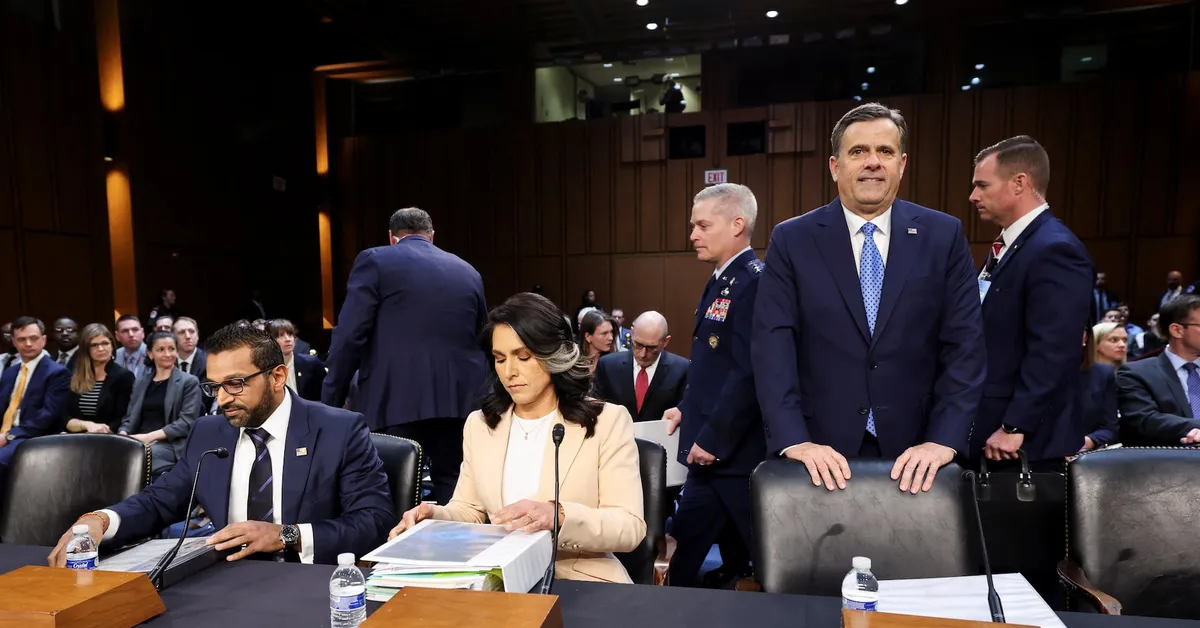
On March 25, 2023, the Trump administration found itself under intense scrutiny following the revelation that a magazine journalist had been inadvertently included in a secret group discussion concerning highly sensitive war plans. This incident has sparked outrage among national security experts and led to calls for resignations from top officials, particularly from Democratic lawmakers.
During a Senate Intelligence Committee hearing, both Director of National Intelligence Tulsi Gabbard and CIA Director John Ratcliffe, who were participants in the controversial group chat, testified that no classified information was exchanged in the discussion conducted via Signal, an encrypted messaging app. However, Senator Angus King, an independent who caucuses with Democrats, expressed skepticism about the lack of classified material, stating, "It's hard for me to believe that targets and timing and weapons would not have been classified."
The extraordinary disclosure has prompted significant backlash, with some members of Congress, including Senator Ron Wyden, emphasizing the need for accountability. "I am of the view that there ought to be resignations, starting with the national security adviser and the secretary of defense," Wyden stated during the hearing. Meanwhile, Senator Jon Ossoff expressed frustration with Ratcliffe's vague responses, asserting, "We will get the full transcript of this chain, and your testimony will be measured carefully against its content."
A former U.S. official highlighted that operational details for military actions are typically classified and known only to a select few within the Pentagon. This information is generally stored on secure networks, underscoring the severity of this security breach. President Donald Trump defended his national security adviser, Michael Waltz, who mistakenly added the journalist to the Signal chat, stating, "Michael Waltz has learned a lesson, and he's a good man."
The National Security Council spokesperson, Brian Hughes, confirmed the authenticity of the chat group, while the White House announced an investigation into how the journalist's number was included. The sharing of classified and sensitive information on commercial apps like Signal is against protocol, and the presence of unknown numbers is particularly concerning. The chat reportedly included accounts representing several high-ranking officials, including Vice President JD Vance and Secretary of State Marco Rubio.
White House press secretary Karoline Leavitt accused the journalist of sensationalizing the incident, claiming that no war plans were discussed. However, the journalist countered these assertions, labeling the situation as "shockingly reckless." The debate continued as Pete Hegseth, another participant in the chat, denied any discussion of war plans, prompting further disputes about the truth of the claims.
Experts in cybersecurity have pointed out that while Signal is generally regarded as a secure platform, the risk lies in the potential compromise of mobile devices themselves. Rocky Cole, from the cybersecurity firm iVerify, stated, "If the phone itself isn't secure, all the Signal messages on that device can be read." This raises serious questions about the appropriateness of using commercial apps for discussing national security information.
Republican Representative Don Bacon, a retired Air Force general, emphasized the necessity of accountability, suggesting that Hegseth should take responsibility for the breach that he argued could put lives at risk. When asked about the White House's claims that no classified details were shared, Bacon remarked, "They ought to just be honest and own up to it."
This unfolding situation highlights the critical importance of maintaining stringent security protocols when handling sensitive information, especially in light of the potential risks posed by reliance on commercial messaging platforms.